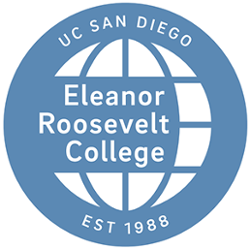Honors
Academic Honors Programs
Honors programs at Eleanor Roosevelt College and UC San Diego have been established to provide exceptionally motivated and capable students with enhanced educational experiences through close interaction with faculty and other honors students.
ERC First Year Honors Seminar
The Freshman Honors Seminar consists of occasional enrichment opportunities and is taught by the ERC Provost. The structure is informal, giving students an opportunity to participate in interactive discussion. There are no exams, but class participation and occasional reading are required. Students receive one unit of credit per quarter.
The fall quarter focuses on enhancing students’ ability to make arguments and marshal evidence in academic settings. In the winter quarter, invited faculty from a range of disciplines discuss current research on topics tied to ERC’s mission. This year we have focused on global climate change and global health.
Members of the Freshman Honors Program are also invited to take part in special enrichment activities. In the last two years honors students have had a seminar with celebrated Lincoln scholar Eric Foner and a private lunch with Eleanor Ostrom, winner of the Nobel Prize in Economics.
Participation in the Freshman Honors Program is by invitation, and based on a combination of high school GPA and SAT or ACT scores.
ERC Sophomore Honors Project
Students who complete the spring quarter of their freshman year with a cumulative grade point average of at least 3.5 and who have completed MMW 11, 12, and 13, are invited to participate in ERC 92, the Sophomore Honors Program. This independent study course enables students to learn the fundamentals of research under the direction of a faculty member.
Participants receive two units of lower-division credit for each quarter they participate. Some students join ongoing research projects; others strike out on their own. Some work in laboratories; others write research papers. Some sustain a single project over the course of a year; others complete their work in a single quarter.
Regardless of topic or format, students in ERC 92 gain valuable knowledge and skills. Recent projects have included study of wetland fertilization experiments, the ideology of the Sons of Liberty, the influence of tourism on folk art in Tonga, and education in China.
Provost Honors
Students are awarded Provost’s Honors each quarter. To be eligible a student must complete at least twelve graded units and receive a minimum grade point average of 3.5. Provost’s Honors are designated on a student’s academic transcript.
Departmental Honors
Outstanding students may qualify to enroll in departmental honors programs. Departments may designate students graduating in their major to receive their degrees with distinction, with high distinction, or with highest distinction. Up to 20 percent of graduating majors may be so honored. They will have completed a special course of study within the department or program, usually including an honors research thesis in addition to special course work. Information on the special courses of study is published in the UCSD General Catalog.
Department Honors will appear on the transcript and diploma for eligible UCSD students.
University Honors
Qualified students graduate with a degree awarded cum laude, magna cum laude, or summa cum laude. A maximum of fourteen percent of graduating seniors may be so honored, and ranking is based on the GPA for at least 72 letter-grade units of course work at the University of California. Typically, the top two percent will graduate summa cum laude; the next four percent, magna cum laude; and the next eight percent, cum laude.
University Honors will appear on the transcript and diploma for eligible UCSD students.
Please visit the Registrar's Office Latin Honors page to view recent GPA cutoffs. NOTE: Must complete at least 72 UC graded units to qualify.Phi Beta Kappa
Phi Beta Kappa is America’s oldest and most prestigious honor society. UC San Diego’s Sigma Chapter is among only 255 chapters chartered since the Society’s founding in 1776. From the beginning Phi Beta Kappa has supported the growth of knowledge, intellectual honesty, tolerance for new and challenging ideas, and the pursuit of a broad range of intellectual interests. Each spring Sigma Chapter invites top students in their junior and senior years to join. Among the selection criteria are a student’s academic record, the breadth and quality of courses taken, and evidence that the student has pursued a rigorous academic program.
Research Opportunities
UC San Diego offers many opportunities for students to develop research skills and to explore career options. Students who are considering graduate and professional school programs are strongly encouraged to develop research experience appropriate to their goals, and to participate in some of the many campus research conferences.
Research experiences range from paid or volunteer work on faculty research projects to research papers required for courses, individual student-initiated research projects, and departmental honors theses. There are also a number of structured research programs such as the Amgen Scholars Program, the Faculty Mentor Program, the McNair Program, and the Summer Research Program. For these and other programs, as well as job opportunities, see the Undergraduate Research Portal.
There are multiple scholarship programs for students interested in research. One such program, sponsored by the Undergraduate Colleges is the Triton Research and Experiential Learning Scholars Program (TRELS). Students with a 2.5 cum GPA and who have an interest in research, guided artistic or creative projects or public service opportunites, under the guidance of a UC san Diego faculty member, may apply for this scholarship.
Internship Programs
Internships provide another avenue for exploring career goals and developing professional networks. Internships may be completed for academic credit, for pay, or as volunteer community service. ERC’s academic advisors can help students identify internship opportunities at home and abroad.

